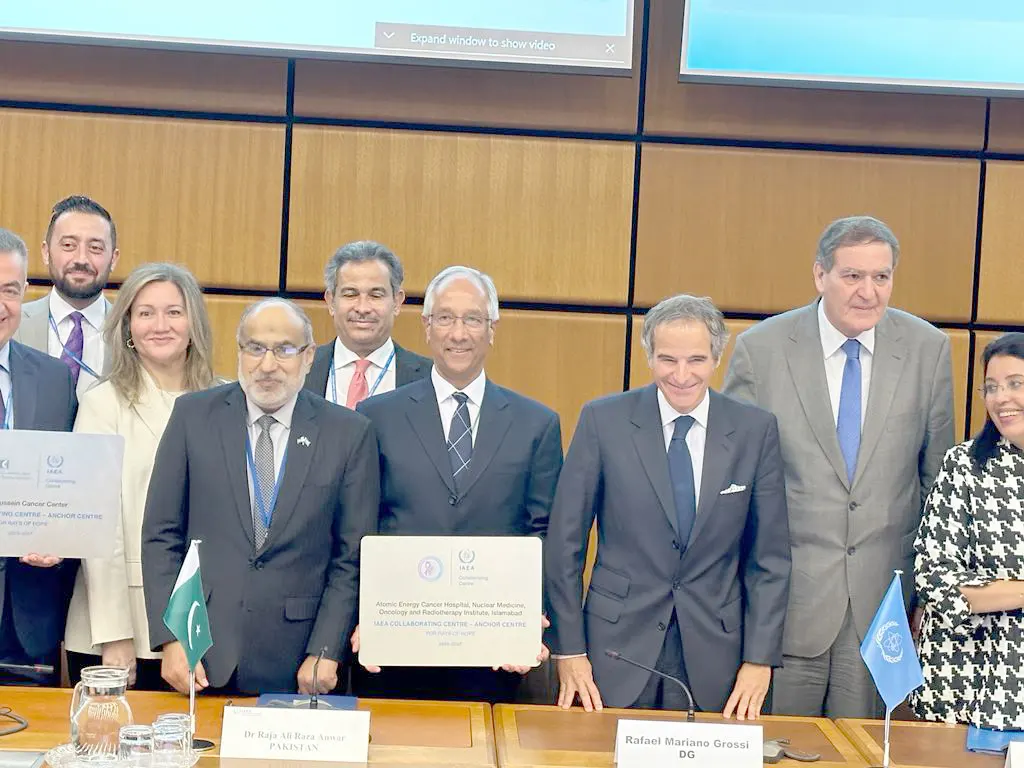Islamabad, 27, September 2023 (TDI): The International Atomic Energy Agency (IAEA) has designated Pakistan’s Nuclear Medicine, Oncology, and Radiotherapy Institute (NORI) as an ‘anchor center’ under its ‘Rays of Hope Initiative.
This initiative is aimed at enhancing Pakistan’s capabilities in cancer research. NORI, established in Islamabad in 1983 and one of the 19 cancer hospitals run by the Pakistan Atomic Energy Commission (PAEC), is the nation’s sole fully equipped tertiary care cancer hospital.
It is specially designed for diagnosing and treating cancer patients and is equipped with advanced technology, including the cyberknife. The formal agreement designating NORI as an anchor center was signed in Vienna during the annual general conference of the IAEA.
These anchor centers are vital cancer facilities with a long history of collaboration with the IAEA, supporting their respective regions.
Anchor centers play a pivotal role in the IAEA’s Rays of Hope (RoH) initiative, which aims to assist member states in developing or expanding their capacities in radiotherapy and medical imaging.
Apart from their primary responsibilities, anchor centers are responsible for training fellows, organizing healthcare provider training programs, participating in IAEA research projects, fostering networks, and providing expertise and mentorship to other radiotherapy and medical imaging centers in their regions.
This development mirrors similar agreements signed with cancer institutes in Algeria, Egypt, Jordan, Morocco, and Turkey, indicating a global commitment to advancing cancer research and treatment.
Within Pakistan’s healthcare sector, the Pakistan Atomic Energy Commission (PAEC) has long harnessed nuclear and advanced techniques for diagnosing and treating cancer-related diseases.
The PAEC actively engages in national cancer awareness, prevention, diagnosis, and treatment programs.
During his address at the annual general conference, PAEC Chairman Dr. Raja Ali Raza Anwar emphasized Pakistan’s unwavering commitment to nuclear safety and security as a national responsibility.
Pakistan has established a comprehensive and rigorously enforced nuclear safety and security framework in line with international standards.
Dr. Ali Raza highlighted Pakistan’s extensive experience in operating safe, secure, and safeguarded nuclear power plants. Currently, Pakistan operates six nuclear power plants with a combined capacity of 3,530MW.
The country’s ambition is to increase nuclear power’s share in the national energy mix, with construction already underway for the Chashma Unit 5 nuclear power plant with a capacity of 1200MW.
Furthermore, Dr. Ali Raza noted that despite being a minor contributor to global greenhouse gas emissions, Pakistan remains highly vulnerable to climate change.
Also Read: 67th IAEA Conference spotlights Pakistan’s peaceful nuclear commitment
He emphasized that nuclear power is indispensable in mitigating climate change and transitioning to a low-carbon energy future, aligning with the belief that nuclear power is an affordable, reliable, and environmentally friendly energy source.
Lastly, Dr. Ali Raza highlighted that the Pakistan Atomic Energy Commission operates 19 cancer hospitals, significantly contributing to the treatment of over 80 percent of the country’s cancer patients.
Iffat Masood is Contributor and Content writer on THE DIPLOMATIC INSIGHT, and also Ambassador from IAMCR. She is perusing her PhD. from UAB Barcelona, Spain in Audio-Video Communications and Advertising.








